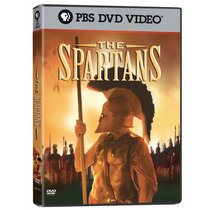| Actor: SPARTANS Genres: Television, Documentary Sub-Genres: Television, Documentary Studio: Pbs Paramount Format: DVD - Color - Closed-captioned DVD Release Date: 04/27/2004 Release Year: 2004 Run Time: 3hr 0min Screens: Color Number of Discs: 1 SwapaDVD Credits: 1 Total Copies: 0 Members Wishing: 1 MPAA Rating: NR (Not Rated) Languages: English |
Search - The Spartans on DVD
  | The Spartans Actor: SPARTANS Genres: Television, Documentary NR 2004 3hr 0min Studio: Paramount Home Video Release Date: 09/30/2005 |
Larger Image |
Movie DetailsSimilar Movies
Similarly Requested DVDs
|
Movie ReviewsA Disappointment Helena P. Schrader | Oslo, Norway | 01/13/2008 (2 out of 5 stars) "Although drawing on the advice of expert Paul Cartelege and producing an excellent visual experience with beautiful on location sequences, the entire documentary is disappointing rehash of the usual clichés about Sparta. The image of Sparta is uni-dimensional, some quotes from Herodotus taken out of context, and the picture of Sparta undifferentiated. For example, there is no evidence whatever that, as suggested in the film, the boys of the agoge lived outside of society for more than a few months, much less that they learned no skills other than survival and fighting. Spartan men were literate, admired for their wit, their terse rhetoric and were skilled in music and dance. The insistance on "compulsory homosexuality" and the image of a society in which men and women led completely separate lives is controversial at best and ridiculous at worst. The focus on Sparta's hoplites alone, while traditional, nevertheless distorts the fact that even Spartan men were only on active service for 10 years and men over the age of 30 no longer had to live in barracks. In fact, they lived on their farms with their wives and children like gentlemen farmers everywhere in the world. Likewise the recurring theme of the oppressed Messenians overlooks the fact that Sparta apparently had very loyal Laconian helots. It is a pity that such a good opportunity for a more balanced view of Sparta was missed in favour of the usual unidimensional treatment. For an alternative interpretation of Sparta based on ancient sources rather than modern myth read any of Helena Schrader's novels set in Ancient Sparta:Are They Singing in Sparta?, Spartan Slave, Spartan Queen: A Tale of Four Women in Sparta, or The Olympic Charioteer" Sips of Lethe, apologies to Clio J. A. Ford | ME United States | 12/30/2009 (3 out of 5 stars) "If anything, this presentation of the Spartans has reinforced my understanding of brain research which finds that memory is synthetic, and, while certain facts are undeniable due to the mass of evidence, we create much of what we consider factual. Some documentaries are up-front about being personal views, and this one would benefit by such a cautionary preface. To inaccuracies mentioned by other reviewers I would add two lapses in well-known textual sources regarding the Spartans and the Peloponnesian War: the comment about a wail of grief passing along the great walls from the port to the city of Athens after the military disaster in Syracuse has been transposed from Xenophon's report in the Hellenica (2.2.3) which mentions this very demonstration of grief after the final defeat of the Athenians at Aegospotami. Following that ultimate defeat, Ms. Hughes mentions -- complete with flames in the foreground -- the burning down of the great walls to the accompaniment of the music of flute-girls. The word Xenophon uses is "kateskapton," which means "demolish, raze to the ground" -- no fire involved. They were, after all, stone walls. Xenophon was a 26 year-old and in Athens at the time of these events, so it seems likely that he was giving true reports. Less serious, but nevertheless confusing, is the reference to the Delphic oracle while at the temple of Athena Pronaia. (Would it not be more appropriate to be at the temple of Apollo for this, where the Oracle was actually given? It is just up the hill from the Tholos.)
I was looking for a fresh and accurate presentation of the Spartans to show to my class as a counterweight to 300 -- which they are all clamoring for me to show. I will probably use this DVD in conjunction with several corrections and words of caution. I have already used Ms. Hughes' DVD Athens: The Dawn of Democracy and found it quite helpful in dispelling the romantic notions we have come to accept regarding Athens and democracy. We would do well to keep in mind that a good part of the world regards our American democracy as imperialistic, like democratic Athens." |
















